Abstract
The presence of disproportionate memory impairment with relatively preserved intellectual functioning was examined in 87 survivors of moderate or severe closed head injury. Approximately one-fourth of the patients tested at 5 to 15 and/or 16 to 42 months after injury manifested defective memory on both auditory and pictorial measures despite obtaining Wechsler Verbal and Performance Intelligence Quotients within the average range. The findings indicate that disproportionately severe memory deficit persists in a subgroup of closed head injured survivors which is reminiscent in some cases of the amnesic disturbance arising from other causes. Evaluation of long term memory in relation to cognitive ability could potentially identify important distinctions for prognosis and rehabilitation in head injured patients.
Full text
PDF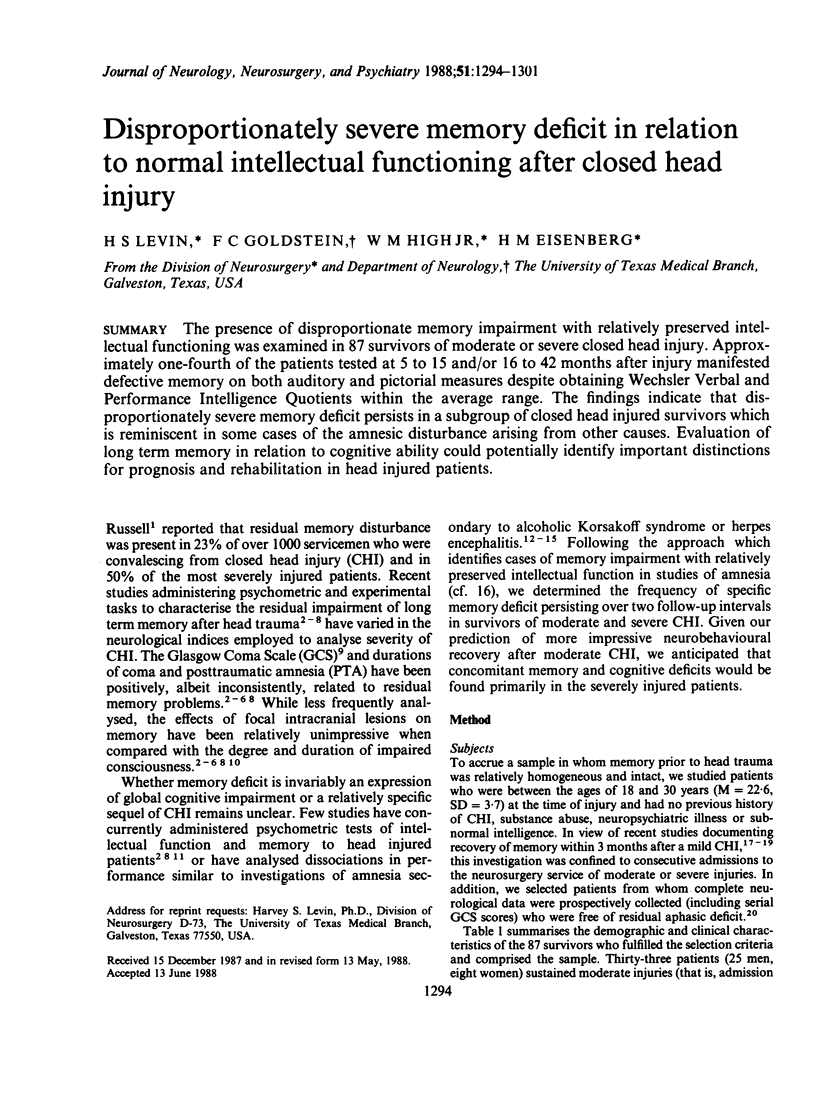
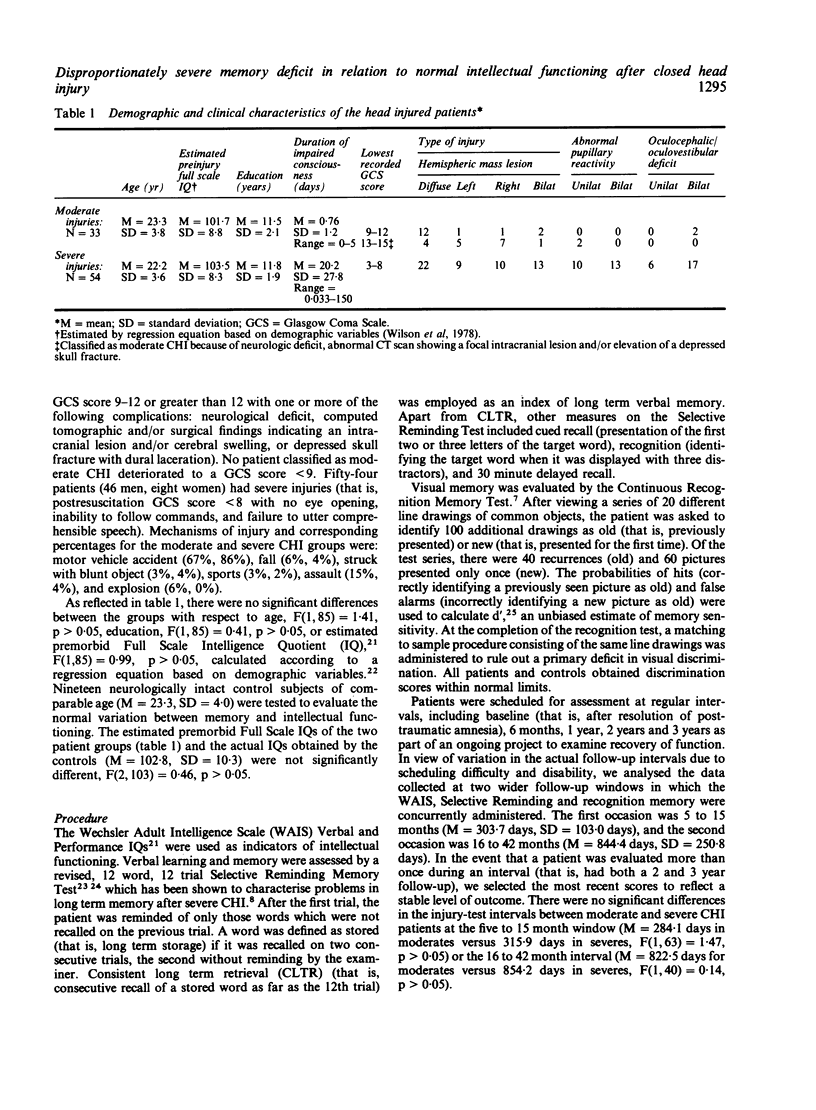
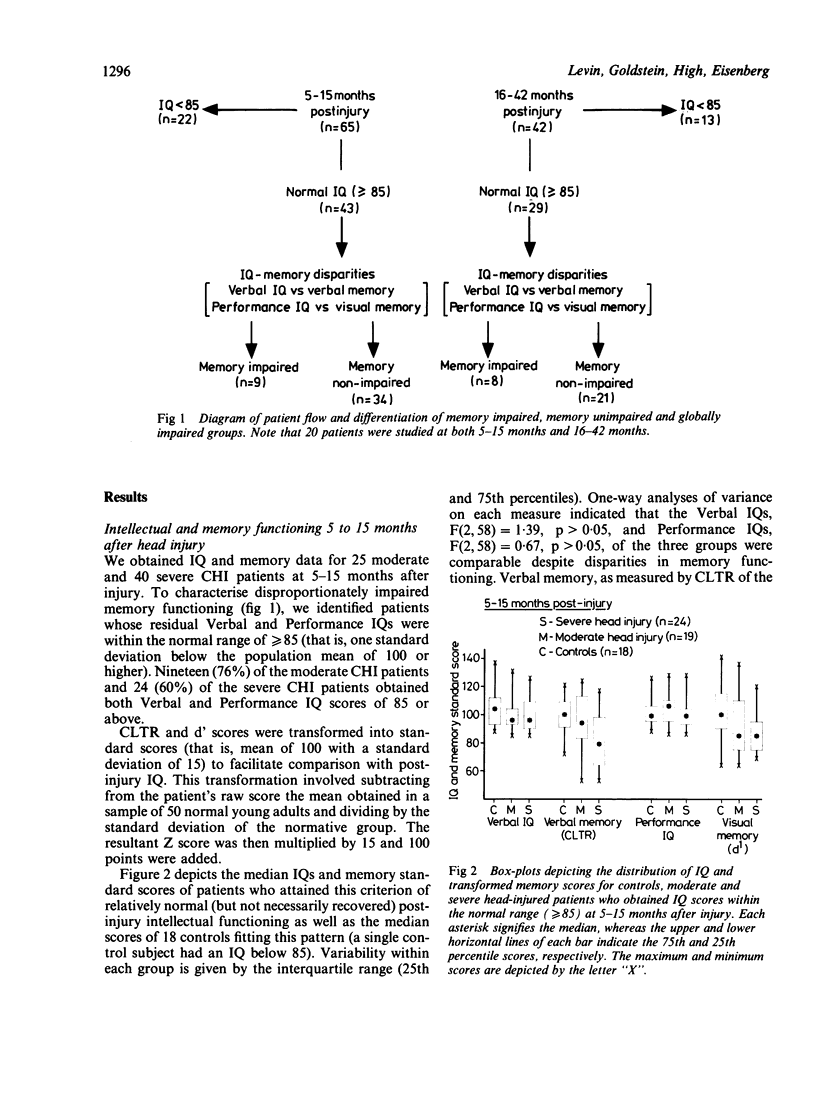
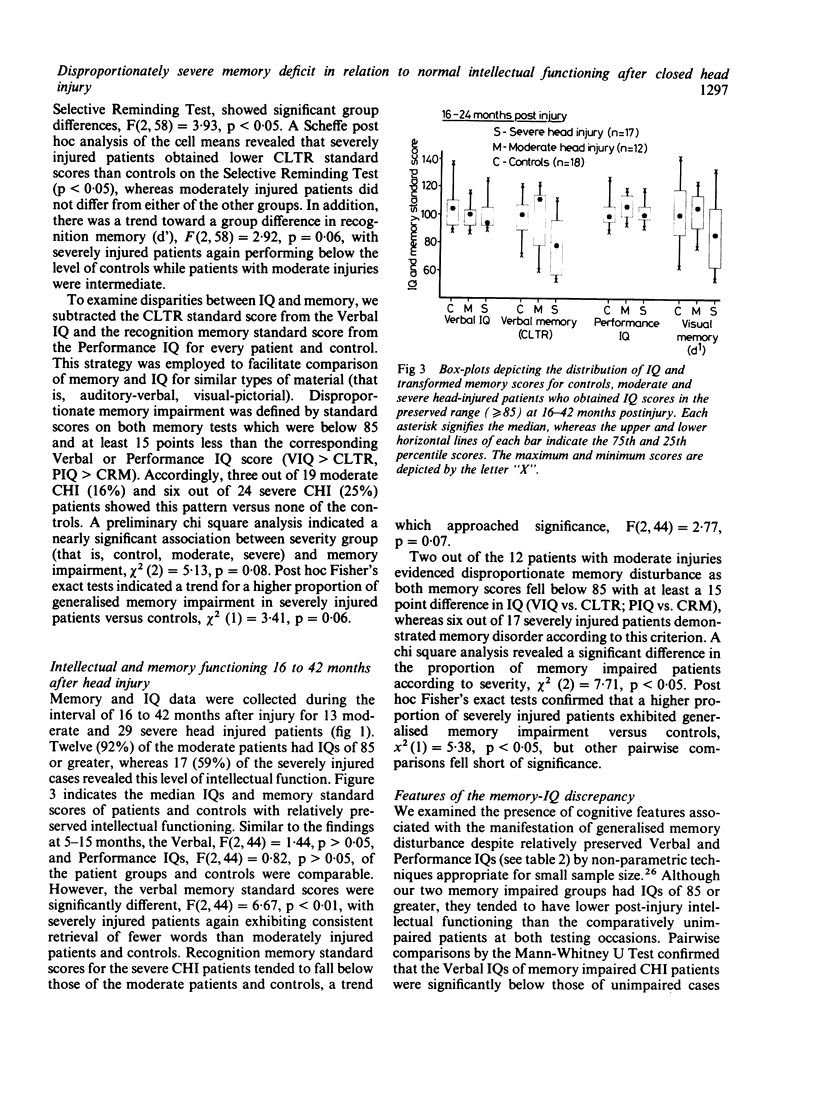
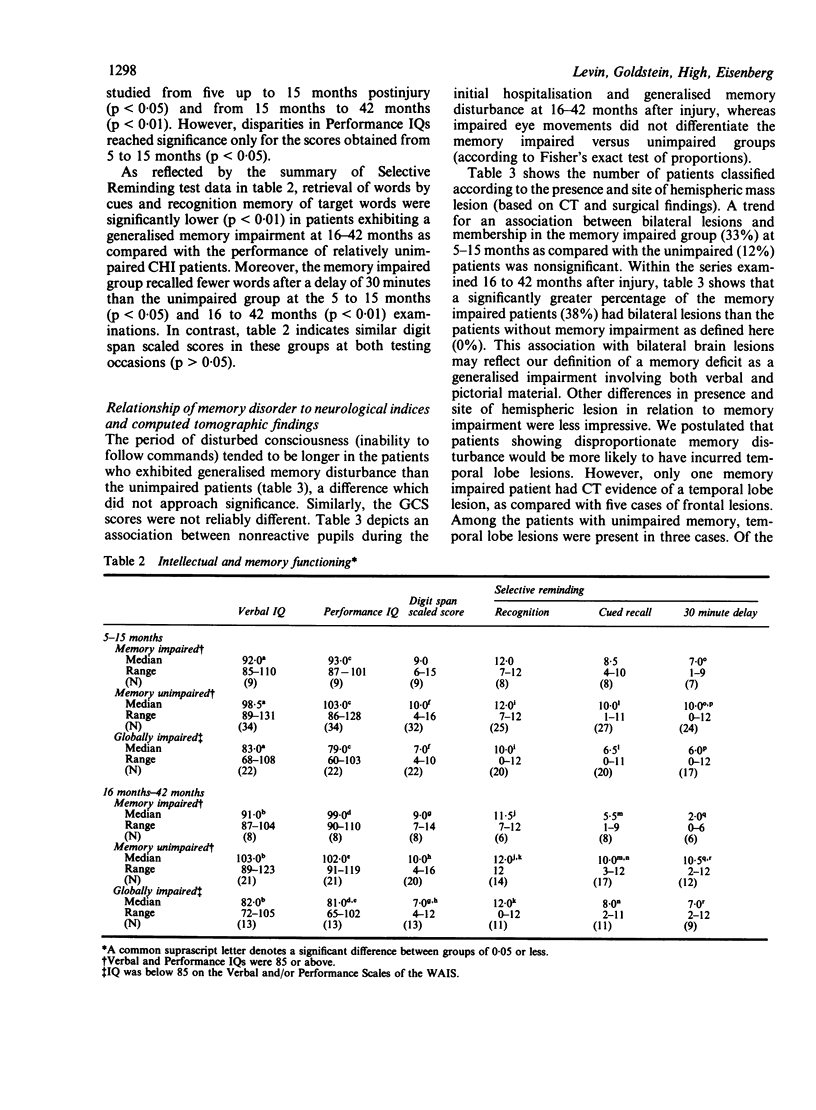
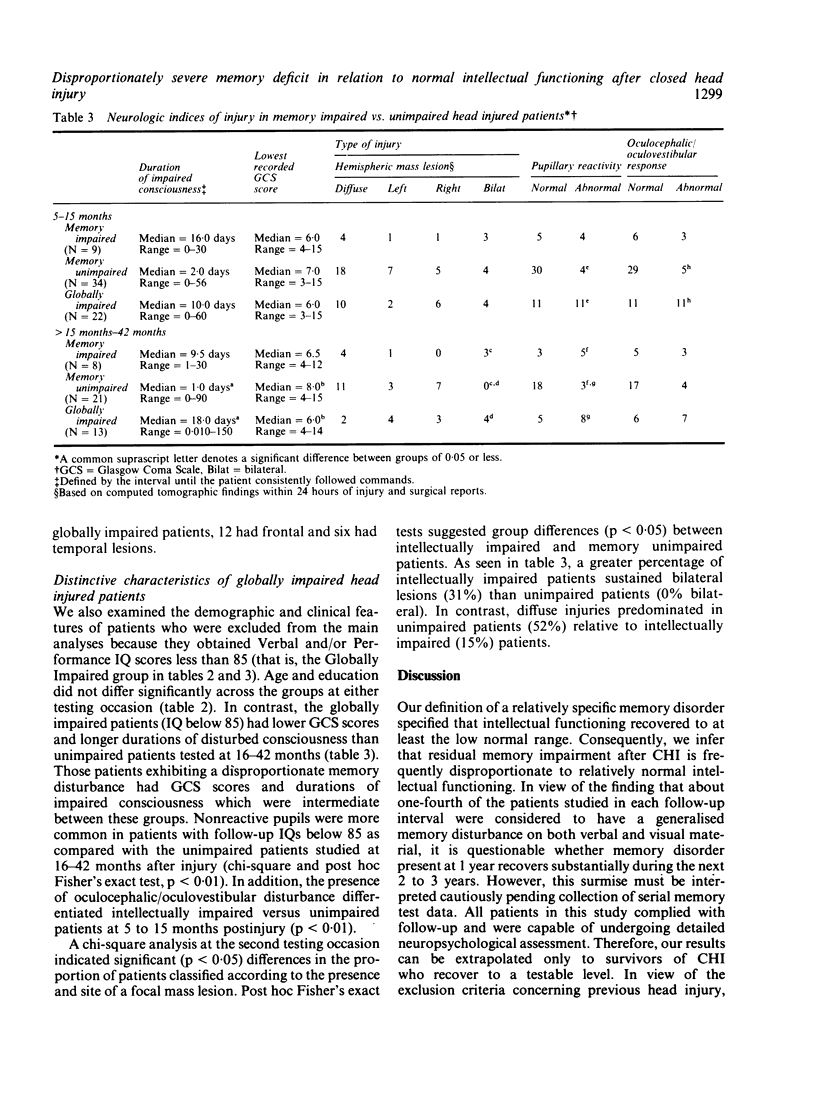
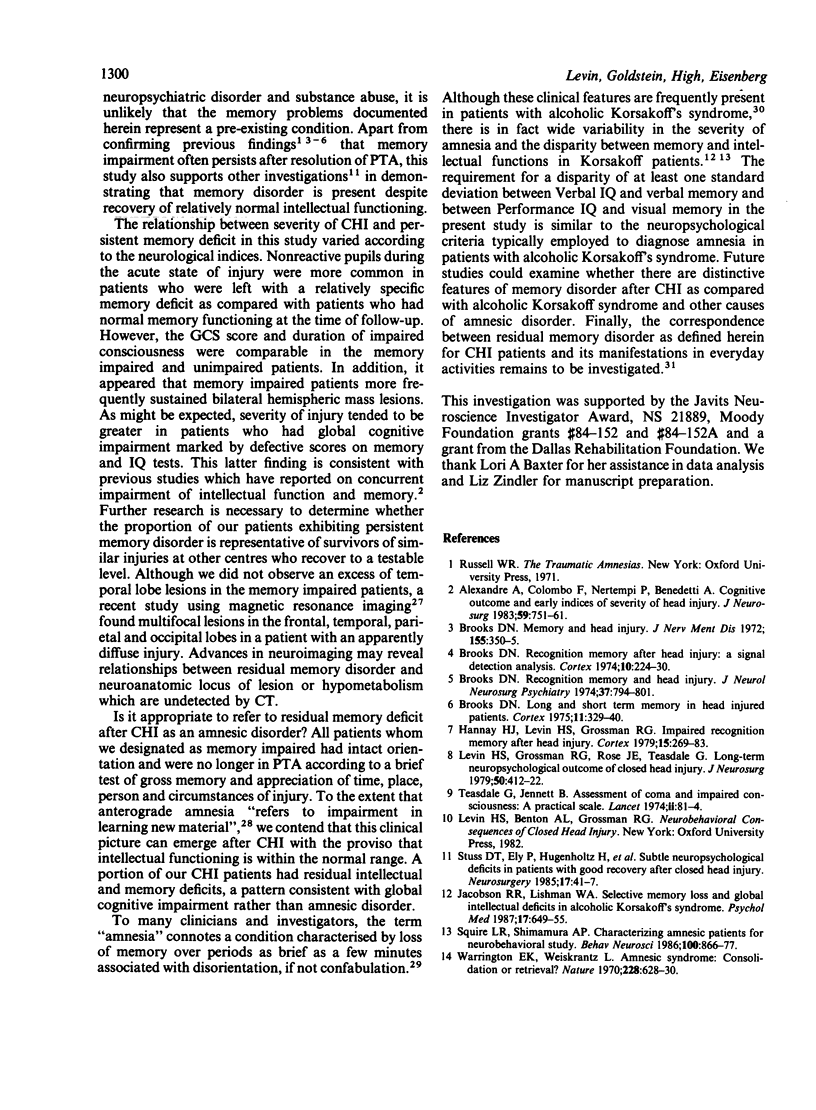
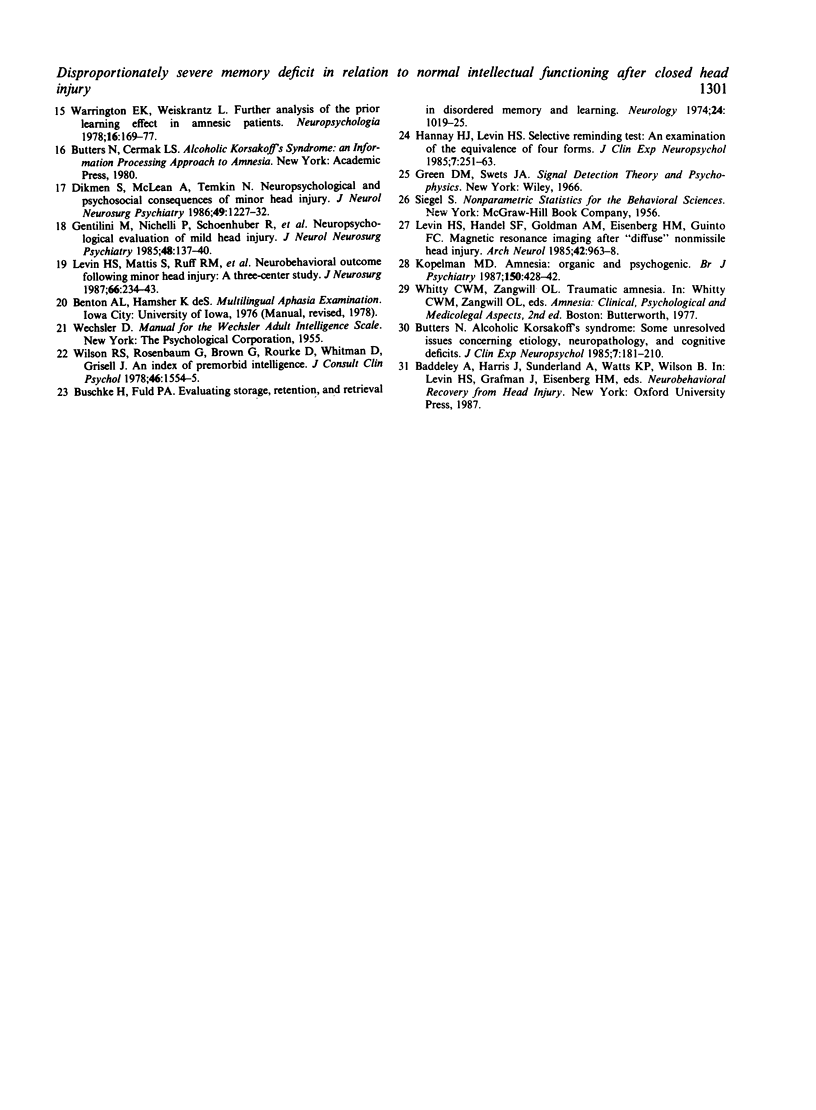
Selected References
These references are in PubMed. This may not be the complete list of references from this article.
- Alexandre A., Colombo F., Nertempi P., Benedetti A. Cognitive outcome and early indices of severity of head injury. J Neurosurg. 1983 Nov;59(5):751–761. doi: 10.3171/jns.1983.59.5.0751. [DOI] [PubMed] [Google Scholar]
- Brooks D. N. Long and short term memory in head injured patients. Cortex. 1975 Dec;11(4):329–340. doi: 10.1016/s0010-9452(75)80025-6. [DOI] [PubMed] [Google Scholar]
- Brooks D. N. Memory and head injury. J Nerv Ment Dis. 1972 Nov;155(5):350–355. doi: 10.1097/00005053-197211000-00007. [DOI] [PubMed] [Google Scholar]
- Brooks D. N. Recognition memory after head injury: a signal detection analysis. Cortex. 1974 Sep;10(3):224–230. doi: 10.1016/s0010-9452(74)80014-6. [DOI] [PubMed] [Google Scholar]
- Brooks D. N. Recognition memory, and head injury. J Neurol Neurosurg Psychiatry. 1974 Jul;37(7):794–801. doi: 10.1136/jnnp.37.7.794. [DOI] [PMC free article] [PubMed] [Google Scholar]
- Butters N. Alcoholic Korsakoff's syndrome: some unresolved issues concerning etiology, neuropathology, and cognitive deficits. J Clin Exp Neuropsychol. 1985 Apr;7(2):181–210. doi: 10.1080/01688638508401252. [DOI] [PubMed] [Google Scholar]
- Dikmen S., McLean A., Temkin N. Neuropsychological and psychosocial consequences of minor head injury. J Neurol Neurosurg Psychiatry. 1986 Nov;49(11):1227–1232. doi: 10.1136/jnnp.49.11.1227. [DOI] [PMC free article] [PubMed] [Google Scholar]
- Gentilini M., Nichelli P., Schoenhuber R., Bortolotti P., Tonelli L., Falasca A., Merli G. A. Neuropsychological evaluation of mild head injury. J Neurol Neurosurg Psychiatry. 1985 Feb;48(2):137–140. doi: 10.1136/jnnp.48.2.137. [DOI] [PMC free article] [PubMed] [Google Scholar]
- Hannay H. J., Levin H. S., Grossman R. G. Impaired recognition memory after head injury. Cortex. 1979 Jun;15(2):269–283. doi: 10.1016/s0010-9452(79)80031-3. [DOI] [PubMed] [Google Scholar]
- Hannay H. J., Levin H. S. Selective reminding test: an examination of the equivalence of four forms. J Clin Exp Neuropsychol. 1985 Jun;7(3):251–263. doi: 10.1080/01688638508401258. [DOI] [PubMed] [Google Scholar]
- Jacobson R. R., Lishman W. A. Selective memory loss and global intellectual deficits in alcoholic Korsakoff's syndrome. Psychol Med. 1987 Aug;17(3):649–655. doi: 10.1017/s0033291700025885. [DOI] [PubMed] [Google Scholar]
- Kopelman M. D. Amnesia: organic and psychogenic. Br J Psychiatry. 1987 Apr;150:428–442. doi: 10.1192/bjp.150.4.428. [DOI] [PubMed] [Google Scholar]
- Levin H. S., Grossman R. G., Rose J. E., Teasdale G. Long-term neuropsychological outcome of closed head injury. J Neurosurg. 1979 Apr;50(4):412–422. doi: 10.3171/jns.1979.50.4.0412. [DOI] [PubMed] [Google Scholar]
- Levin H. S., Handel S. F., Goldman A. M., Eisenberg H. M., Guinto F. C., Jr Magnetic resonance imaging after 'diffuse' nonmissile head injury. A neurobehavioral study. Arch Neurol. 1985 Oct;42(10):963–968. doi: 10.1001/archneur.1985.04060090045012. [DOI] [PubMed] [Google Scholar]
- Levin H. S., Mattis S., Ruff R. M., Eisenberg H. M., Marshall L. F., Tabaddor K., High W. M., Jr, Frankowski R. F. Neurobehavioral outcome following minor head injury: a three-center study. J Neurosurg. 1987 Feb;66(2):234–243. doi: 10.3171/jns.1987.66.2.0234. [DOI] [PubMed] [Google Scholar]
- Squire L. R., Shimamura A. P. Characterizing amnesic patients for neurobehavioral study. Behav Neurosci. 1986 Dec;100(6):866–877. doi: 10.1037//0735-7044.100.6.866. [DOI] [PubMed] [Google Scholar]
- Stuss D. T., Ely P., Hugenholtz H., Richard M. T., LaRochelle S., Poirier C. A., Bell I. Subtle neuropsychological deficits in patients with good recovery after closed head injury. Neurosurgery. 1985 Jul;17(1):41–47. doi: 10.1227/00006123-198507000-00007. [DOI] [PubMed] [Google Scholar]
- Teasdale G., Jennett B. Assessment of coma and impaired consciousness. A practical scale. Lancet. 1974 Jul 13;2(7872):81–84. doi: 10.1016/s0140-6736(74)91639-0. [DOI] [PubMed] [Google Scholar]
- Warrington E. K., Weiskrantz L. Amnesic syndrome: consolidation or retrieval? Nature. 1970 Nov 14;228(5272):628–630. doi: 10.1038/228628a0. [DOI] [PubMed] [Google Scholar]
- Warrington E. K., Weiskrantz L. Further analysis of the prior learning effect in amnesic patients. Neuropsychologia. 1978;16(2):169–177. doi: 10.1016/0028-3932(78)90104-5. [DOI] [PubMed] [Google Scholar]
- Wilson R. S., Rosenbaum G., Brown G., Rourke D., Whitman D., Grisell J. An index of premorbid intelligence. J Consult Clin Psychol. 1978 Dec;46(6):1554–1555. [PubMed] [Google Scholar]


